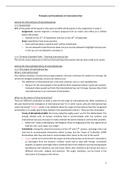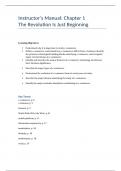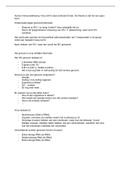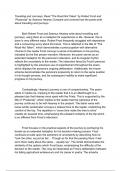Principles and foundations of international law
Lecture 1A: the functions of international law
>>>> Assessment:
80% of the grade will be based on the exam and 20% will be based on the assignment in week 4.
- Assignment: reverse engineer a research proposal from an article and reflect on it (reflect
within 500 words).
o Opened on the 22nd of September and due on the 26th of September.
- Exam: hypothetical and essay question.
o Exam will take place in week 8 and it will be closed book.
o You are allowed to take the Evans book, but you are only allowed to highlight and put post-
it, but you are not allowed to annotate it.
>>>> Christine Schwöbel-Patel – Teaching international law
This article causes awareness to the fact that teaching international law has been really euro centric.
Lecture 1B: the (colonial) history of international law
>>>> The origins of international law:
What is international law?
The relations between (1) autonomous legal subjects; (2) some continuity for patterns to emerge; (3)
cannot be changed unilaterally, at least not without cost.
- This definition of international law is the most common, but it is not unproblematic.
o Because for the most people in the world the third component doesn’t quite yet resonate.
Colonized states would not think that international law can’t change, because they think
international law is an instrument of domination.
What are the origins of international law?
There are different contenders to make a claim for the origin of international law. What conditions in
the past fostered the emergence of international law? Or in other words, why did international law
come into being? Klabbers wrote in his textbook about the origin of international law that ‘by general
acclamation it is usually said to have started in the seventeenth century’. These are the contenders:
- Treaty of Westphalia (1648): the treaty ended the eighty years’ war for The Netherlands. The
already divided units of Europe somehow had to accommodate with one another, and
international law was necessary to make ordered interaction between communities possible.
o Before the Treaty of Westphalia, the Religious Peace of Augsburg (1555) was signed which
held the rule ‘cuius regio, eius religio’.
- Colonialism: during the colonial encounters of the 16th and 17th century, sovereign rulers not
only had to accommodate themselves within Europe, but the Treaty of Tordesillas (1494)
foreshadows that they also had to accommodate their claims to the rest of the world.
o Anghie writes in his article that the origins of international law can be found in colonialism,
as sovereigns from the western 'civilized' world had to deal with foreign 'uncivilized'
peoples. European sovereigns had to somehow deal in the relations not only among equals
(protestants and Catholics), but also those others who seemed to be human but have a
different skin-color, religion and practices. The origin, therefore, can be found in the
interaction of Europeans with others.
1
, - A lunch in Ghent (1873): The Institute of International Law was founded, and it aspired to be
the conscience of the civilized world, wanting to recognize the rules that were necessary to
make the world more civilized (in other words: more civilized in the image of Europe).
According to Koskeniemi the origins of international law can be traced back to this event.
- Jus Gentium: Crawford writes that “the law of nations, now known as (public) international
law, developed out of the late medieval jus gentium. Through an influential series of writers –
Vitoria, Gentili, Grotius, Pufendorf, Wolff, Vattel and others – it came to be seen as a
specialized body of legal thinking about the relations between rulers”.
o The placing of this origin is, however, problematic, because it is a western and Eurocentric
idea. The writers he refers to are all Europeans.
- The writings of Hugo Grotius.
à NB: before the seventeenth century states also had to accommodate with one another, so there
was ordered interaction between communities. For example, Mesopotamia (4th/3rd century BC) and
Greek antiquity: rich practice of arbitration; diplomatic interaction; treaty-making; conduct of war
(Neff).
à CONCLUSION: it is difficult to pinpoint the origin of international law, because there is not a right
answer as there are different conceptions of international law.
Why is studying international law important?
Studying international law is important for the following reasons:
- Know stuff about international law’s history (key events).
- Show development/progress: from primitive origins to fairly complex legal regime(s).
- Be able to answer the question why international law has developed the way it did and why it
is not different (better/worse).
- To understand what international law has been/is for and to understand its function and
functioning. You could ask yourself the following questions: what does it do? What is it?
Instrument of progress? Or of repression? Of emancipation? Or of domination? What has
made it more one thing rather than the other? How, why and when did it happen?
- We might learn from history in order to learn from it.
o The history that we will see, is likely to reflect the questions that we are asking about it
and the questions we are asking about it are shaped by our present dreams, concerns,
fears, ambitions, etc. So, it is impossible to get out of the present and turn to the past.
>>>> Francisco de Vitoria:
Anghie writes about Francisco de Vitoria, who was a Dominican scholar writing on the natural law
foundations of (international) law. The context of his writing was lectures at the University of
Salamanca (1537 – 1539).
- What is the problem Vitoria is trying to solve?
o The problem was that there were different customs in the region Spain was conquering
and so Spain was faced with the question of what uniform set of rules to subject the
conquered territories to. So, Spain encountered non-Europeans in Latin-America and it
was faced with the question how to treat them under the law and how to include them in
the European legal order.
2
, à CONCLUSION: the main question was what the legal positions of the local population in
South America was and which laws applied to them (and to the interaction with the
Spanish).
• The position of the local people (‘Indians’), according to Vitoria:
§ Pro: Indians are human, but they do not have the capacity to live up to the
standards of reason as they were practiced in Europe. They have that capacity, but
like children they are not yet capable of exercising that capacity.
w Indians are endowed with reason (unlike animals) and Vitoria opposed (many)
other scholars, who saw Indians in analogy to animals (‘nothing wrong with
killing a pig, nor with Indians’).
w Indians are subjects of the law (and therefore also law’s rights and duties) and
they can be part of the legal order, because the Indians are endowed with
reason.
w Law applies to Indians and Spanish alike, so in principle they are equal.
§ Con: Indians and Spanish are formally equal, but practically they are unequal.
w Because the law applies to Indians and Spanish alike, the Indians are presumed
to be equal and they are included in a legal order that then justifies their
exclusion.
w The law under which Indians and Spanish are equal is essentially European.
w Universal law, that applies equally to everyone, demands facilitation of free
commerce which means that the Indians could not expel or resist foreigners
who come in peace (to do business).
w Local resistance against the Spanish becomes an act of war and is an
aggression against which violence is justified.
w The Spanish response, the use of force to ‘facilitate trade’, is justified.
w Spanish colonialism is justified through ‘prior’ violations of the law.
à CONCLUSION: the effect of the inclusion of the local population was to give them
rights and duties, but also to subject them to the natural law that resistance justifies
war and subjugation. So, the main effect of inclusion was to justify Spanish colonialism:
inclusion with the immediate effect of being excluded again.
In conclusion, what seems to be equal turns out to be effectively unequal. So, you include on a
supposedly equal footing to then include a difference and to have a distinction that treats differently
a part of the population, that are supposed to be equal.
>>>> Hugo Grotius:
He moved on from the natural law tradition, because it was no longer sufficient to function as the basis
for society. The practical intercourse of states became so specific that the natural law as a basis for
relations was no longer enough, so we had to have a different add on, which was the jus gentium.
- Grotius made the distinction between jus gentium (the law of nations, which grew out of
social/human interactions and can be discovered through reason and made through will) and
jus naturale (the law of nature, which is God-given)(Neff, p. 8).
- Grotius wrote de jure belli ac pacis (on the law of war and peace).
o Simultaneous application of natural law and jus gentium to international affairs.
3
, >>>> Territorial states (> 16th century):
For some time ‘sovereignty’ was seen as a main characteristic of a ruler (according to Hobbes) or a
main characteristic of the people (according to Bodin). However, according to international law the
state is sovereign and not the people or the ruler.
- The great powers agreed that they had to set up a Congress that secures the order, peace and
stability. This is how the Treaty of Vienna (1815) came into being at the Congress of Vienna.
o The goal was the restoring of the (legitimate) order in Europe through (1) balance over
power (equality); (2) recognized principles (substantive component: basically, respect
hereditary legitimacy).
o The great powers concluded that they were equal and that they recognize each other as
equals and that they should not intervene in each other’s affairs.
o This foreshadows institutionalization of international law together with institutionalized
hierarchy: some empowered to enforce/impose supposedly universal principles.
o Simpson describes the Congress of Vienna as a system in which ‘a small number of states
regulate, through law, the affairs of the rest (within) a system in which sovereign states
interact as free and equals’. However, in practice there was a substantive criterium that
allowed for differentiation and different treatment.
>>>> 19th century legal positivism:
This is the continuation of Grotius’ jus gentium, because it is manmade law and it depends on the
will/volition and not on God.
- But ideas of jus naturale and jus gentium did not evaporate, but they appeared in different
manifestations, for instance in ideas such as jus cogens (some laws are so important that any
law that goes against it will be null and void) and in self-understanding of international lawyers.
- During the 19th century an expansion of international law took place.
o Signs that the idea of natural law has not quite gone away are the founding of the Institut
de Droit International (IDI) and the International Law Association (ILA).
• “They are founded with the purpose to promote the progress of international law by
striving to formulate the general principles of the subject, in such a way as to
correspond to the legal conscience of the civilized world” (art. 1 IDI).
>>>> Berlin conference (1885):
During the Berlin conference the African continent was divided between European nations.
- The conference was opened by Bismarck, who stated that the conference has a humanitarian
objective, which is to associate the indigenous population with the standards of civilization to
open up the continent to commerce and to give the inhabitants the means to instruct
themselves.
- The conference had the following aims:
o Freedom of navigation of Congo rivers.
o Freedom of trade in Congo basin and mouth.
o Agreeing on rules concerning acquisition of new territory Þ effective occupation, showing
sufficient authority.
4
Lecture 1A: the functions of international law
>>>> Assessment:
80% of the grade will be based on the exam and 20% will be based on the assignment in week 4.
- Assignment: reverse engineer a research proposal from an article and reflect on it (reflect
within 500 words).
o Opened on the 22nd of September and due on the 26th of September.
- Exam: hypothetical and essay question.
o Exam will take place in week 8 and it will be closed book.
o You are allowed to take the Evans book, but you are only allowed to highlight and put post-
it, but you are not allowed to annotate it.
>>>> Christine Schwöbel-Patel – Teaching international law
This article causes awareness to the fact that teaching international law has been really euro centric.
Lecture 1B: the (colonial) history of international law
>>>> The origins of international law:
What is international law?
The relations between (1) autonomous legal subjects; (2) some continuity for patterns to emerge; (3)
cannot be changed unilaterally, at least not without cost.
- This definition of international law is the most common, but it is not unproblematic.
o Because for the most people in the world the third component doesn’t quite yet resonate.
Colonized states would not think that international law can’t change, because they think
international law is an instrument of domination.
What are the origins of international law?
There are different contenders to make a claim for the origin of international law. What conditions in
the past fostered the emergence of international law? Or in other words, why did international law
come into being? Klabbers wrote in his textbook about the origin of international law that ‘by general
acclamation it is usually said to have started in the seventeenth century’. These are the contenders:
- Treaty of Westphalia (1648): the treaty ended the eighty years’ war for The Netherlands. The
already divided units of Europe somehow had to accommodate with one another, and
international law was necessary to make ordered interaction between communities possible.
o Before the Treaty of Westphalia, the Religious Peace of Augsburg (1555) was signed which
held the rule ‘cuius regio, eius religio’.
- Colonialism: during the colonial encounters of the 16th and 17th century, sovereign rulers not
only had to accommodate themselves within Europe, but the Treaty of Tordesillas (1494)
foreshadows that they also had to accommodate their claims to the rest of the world.
o Anghie writes in his article that the origins of international law can be found in colonialism,
as sovereigns from the western 'civilized' world had to deal with foreign 'uncivilized'
peoples. European sovereigns had to somehow deal in the relations not only among equals
(protestants and Catholics), but also those others who seemed to be human but have a
different skin-color, religion and practices. The origin, therefore, can be found in the
interaction of Europeans with others.
1
, - A lunch in Ghent (1873): The Institute of International Law was founded, and it aspired to be
the conscience of the civilized world, wanting to recognize the rules that were necessary to
make the world more civilized (in other words: more civilized in the image of Europe).
According to Koskeniemi the origins of international law can be traced back to this event.
- Jus Gentium: Crawford writes that “the law of nations, now known as (public) international
law, developed out of the late medieval jus gentium. Through an influential series of writers –
Vitoria, Gentili, Grotius, Pufendorf, Wolff, Vattel and others – it came to be seen as a
specialized body of legal thinking about the relations between rulers”.
o The placing of this origin is, however, problematic, because it is a western and Eurocentric
idea. The writers he refers to are all Europeans.
- The writings of Hugo Grotius.
à NB: before the seventeenth century states also had to accommodate with one another, so there
was ordered interaction between communities. For example, Mesopotamia (4th/3rd century BC) and
Greek antiquity: rich practice of arbitration; diplomatic interaction; treaty-making; conduct of war
(Neff).
à CONCLUSION: it is difficult to pinpoint the origin of international law, because there is not a right
answer as there are different conceptions of international law.
Why is studying international law important?
Studying international law is important for the following reasons:
- Know stuff about international law’s history (key events).
- Show development/progress: from primitive origins to fairly complex legal regime(s).
- Be able to answer the question why international law has developed the way it did and why it
is not different (better/worse).
- To understand what international law has been/is for and to understand its function and
functioning. You could ask yourself the following questions: what does it do? What is it?
Instrument of progress? Or of repression? Of emancipation? Or of domination? What has
made it more one thing rather than the other? How, why and when did it happen?
- We might learn from history in order to learn from it.
o The history that we will see, is likely to reflect the questions that we are asking about it
and the questions we are asking about it are shaped by our present dreams, concerns,
fears, ambitions, etc. So, it is impossible to get out of the present and turn to the past.
>>>> Francisco de Vitoria:
Anghie writes about Francisco de Vitoria, who was a Dominican scholar writing on the natural law
foundations of (international) law. The context of his writing was lectures at the University of
Salamanca (1537 – 1539).
- What is the problem Vitoria is trying to solve?
o The problem was that there were different customs in the region Spain was conquering
and so Spain was faced with the question of what uniform set of rules to subject the
conquered territories to. So, Spain encountered non-Europeans in Latin-America and it
was faced with the question how to treat them under the law and how to include them in
the European legal order.
2
, à CONCLUSION: the main question was what the legal positions of the local population in
South America was and which laws applied to them (and to the interaction with the
Spanish).
• The position of the local people (‘Indians’), according to Vitoria:
§ Pro: Indians are human, but they do not have the capacity to live up to the
standards of reason as they were practiced in Europe. They have that capacity, but
like children they are not yet capable of exercising that capacity.
w Indians are endowed with reason (unlike animals) and Vitoria opposed (many)
other scholars, who saw Indians in analogy to animals (‘nothing wrong with
killing a pig, nor with Indians’).
w Indians are subjects of the law (and therefore also law’s rights and duties) and
they can be part of the legal order, because the Indians are endowed with
reason.
w Law applies to Indians and Spanish alike, so in principle they are equal.
§ Con: Indians and Spanish are formally equal, but practically they are unequal.
w Because the law applies to Indians and Spanish alike, the Indians are presumed
to be equal and they are included in a legal order that then justifies their
exclusion.
w The law under which Indians and Spanish are equal is essentially European.
w Universal law, that applies equally to everyone, demands facilitation of free
commerce which means that the Indians could not expel or resist foreigners
who come in peace (to do business).
w Local resistance against the Spanish becomes an act of war and is an
aggression against which violence is justified.
w The Spanish response, the use of force to ‘facilitate trade’, is justified.
w Spanish colonialism is justified through ‘prior’ violations of the law.
à CONCLUSION: the effect of the inclusion of the local population was to give them
rights and duties, but also to subject them to the natural law that resistance justifies
war and subjugation. So, the main effect of inclusion was to justify Spanish colonialism:
inclusion with the immediate effect of being excluded again.
In conclusion, what seems to be equal turns out to be effectively unequal. So, you include on a
supposedly equal footing to then include a difference and to have a distinction that treats differently
a part of the population, that are supposed to be equal.
>>>> Hugo Grotius:
He moved on from the natural law tradition, because it was no longer sufficient to function as the basis
for society. The practical intercourse of states became so specific that the natural law as a basis for
relations was no longer enough, so we had to have a different add on, which was the jus gentium.
- Grotius made the distinction between jus gentium (the law of nations, which grew out of
social/human interactions and can be discovered through reason and made through will) and
jus naturale (the law of nature, which is God-given)(Neff, p. 8).
- Grotius wrote de jure belli ac pacis (on the law of war and peace).
o Simultaneous application of natural law and jus gentium to international affairs.
3
, >>>> Territorial states (> 16th century):
For some time ‘sovereignty’ was seen as a main characteristic of a ruler (according to Hobbes) or a
main characteristic of the people (according to Bodin). However, according to international law the
state is sovereign and not the people or the ruler.
- The great powers agreed that they had to set up a Congress that secures the order, peace and
stability. This is how the Treaty of Vienna (1815) came into being at the Congress of Vienna.
o The goal was the restoring of the (legitimate) order in Europe through (1) balance over
power (equality); (2) recognized principles (substantive component: basically, respect
hereditary legitimacy).
o The great powers concluded that they were equal and that they recognize each other as
equals and that they should not intervene in each other’s affairs.
o This foreshadows institutionalization of international law together with institutionalized
hierarchy: some empowered to enforce/impose supposedly universal principles.
o Simpson describes the Congress of Vienna as a system in which ‘a small number of states
regulate, through law, the affairs of the rest (within) a system in which sovereign states
interact as free and equals’. However, in practice there was a substantive criterium that
allowed for differentiation and different treatment.
>>>> 19th century legal positivism:
This is the continuation of Grotius’ jus gentium, because it is manmade law and it depends on the
will/volition and not on God.
- But ideas of jus naturale and jus gentium did not evaporate, but they appeared in different
manifestations, for instance in ideas such as jus cogens (some laws are so important that any
law that goes against it will be null and void) and in self-understanding of international lawyers.
- During the 19th century an expansion of international law took place.
o Signs that the idea of natural law has not quite gone away are the founding of the Institut
de Droit International (IDI) and the International Law Association (ILA).
• “They are founded with the purpose to promote the progress of international law by
striving to formulate the general principles of the subject, in such a way as to
correspond to the legal conscience of the civilized world” (art. 1 IDI).
>>>> Berlin conference (1885):
During the Berlin conference the African continent was divided between European nations.
- The conference was opened by Bismarck, who stated that the conference has a humanitarian
objective, which is to associate the indigenous population with the standards of civilization to
open up the continent to commerce and to give the inhabitants the means to instruct
themselves.
- The conference had the following aims:
o Freedom of navigation of Congo rivers.
o Freedom of trade in Congo basin and mouth.
o Agreeing on rules concerning acquisition of new territory Þ effective occupation, showing
sufficient authority.
4












